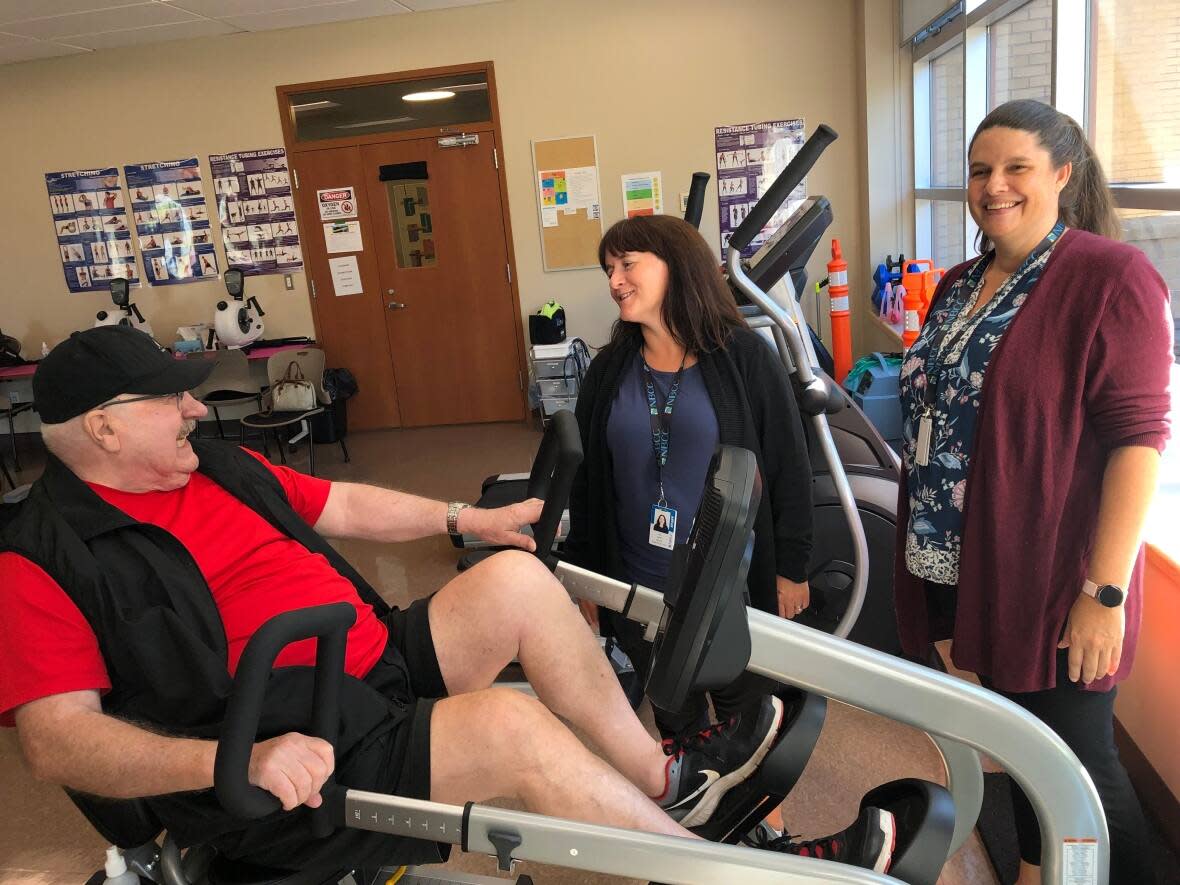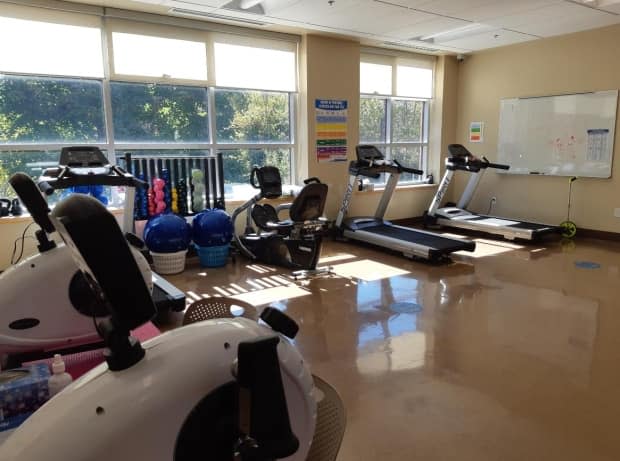Promising COPD pilot program offers new lease on life for patients

As Neil Lydon adjusts the seat on a recumbent stepper machine, he chuckles, looking back on his first days in the Saint John-based pulmonary rehabilitation program.
"I was never brought up with sports, and I see a machine and I think, 'Oooh … effort,'" he says.
After living with chronic obstructive pulmonary disease, or COPD, for more than a decade, a respirologist referred Lydon to the promising pilot initiative. There is no cure for COPD, but the program aims to build a patient's stamina and, ultimately, keep them out of the hospital.
"Blood oxygen is low, so you use up whatever energy you've got pretty quickly," he said.
"My doctor said, 'Maybe we'll try you on some meds,' and in the end I wound up on two different medications, and he thought it would be a good idea to get some physicality into the program.
"It sort of got me out of my inertia."

Lydon said the gym wasn't an environment he was familiar with, but then he found he could use the machines that best suited his fitness level at that time.
"I tried the treadmill, but I got very winded, very quickly on that … I did push my limits on the step machine," he says. "I increased that from three or four hundred steps up to 1,700-and-something by the time I'd finished. It took about half an hour."
The rehab program is a research project and is infused with students from the New Brunswick Community College and the University of New Brunswick. Students from a number of disciplines, such as respiratory therapy, nursing and pharmacy technology, work almost one-on-one with the seniors who take part.
To be eligible, participants have to be at least 60 years old and living with moderate to severe COPD with nothing to disqualify them, like a recent heart attack, uncontrolled blood pressure or being at risk for falls.
One in five seniors
Tammie Fournier, a respiratory therapist and chair of Allied Health programs for NBCC, says one in five New Brunswick seniors have COPD.
"People living with COPD experience shortness of breath and they have a chronic cough. The combination of those two symptoms would lead to inactivity which inevitably worsens with their condition," Fournier said.
"So the worsening shortness of breath and cough and decrease in activity really become this vicious cycle that robs people with COPD of their quality of life over time."
This program is meant to break that cycle, and Fournier says it's shown some exciting results.

"One person decided not to sell their home after completing the clinic reduced their shortness of breath while climbing their stairs," she said. "Two other participants both gained enough strength to travel to Toronto and receive life-saving lung transplantation."
In a computer lab-turned-gym at NBCC's Allied Health Education Centre on the UNB campus, the seniors in the program build their endurance using gym equipment, free weights and drumming exercises.
Besides helping participants increase their stamina, the program also teaches them how to properly take their medications to get the most out of them and what to do if symptoms suddenly get worse.
Robyn Palk, the co-ordinator of the program, says a participant told her that information helped her avoid calling an ambulance after accidentally inhaling fumes while she was cleaning her oven. The woman thought back to classes on breath techniques and was able to take control of her breathing, Palk said.
"The hospitals are full," Palk said. "You don't want to be short of breath and having to wait in an emergency room for an extended period of time. If there are steps you can take at home to keep yourself out of hospital, that's really important right now."
Big savings
New Brunswick spends $23 million annually on COPD, Fournier said, which equates to about 3,100 hospital admissions at $7,400 per admission.
"The program is decreasing the risk of lung attack in 80 men and women, or about 0.14 per cent of our New Brunswick COPD population," she said. "So by extension, if each one of those participants reduces their admission to hospital by only one, this could save almost $600,000 of health-care spending on those 80 people alone."
Funding for the program comes from the Healthy Seniors pilot project, a $75-million provincial and federal initiative to research ways to better support the aging population.
However, the funding ends in 2023, Fournier said, and they're now looking for a source of sustainable funding to ensure it can continue.

"I've been a respiratory therapist,and Robyn has as well, for over 20 years now," said program co-ordinator Lisa Curtis. "This is the most rewarding work we've ever done because we get to spend so much more time with people than you do in acute care."
Curtis says over the course of the program, they get to watch participants go from barely making it into the building to coming in with a smile, and getting on a treadmill and walking for 30 minutes.
What happens to the research?
Curtis and Palk say they've been in contact with other institutions across Canada hoping to set up their own programs, and they've developed a how-to manual or toolkit for getting a program started.
They've also been selected to present at an international conference on COPD.
Neil Lydon hopes more people hear about the program that's helped him.
"I think people who are out there who have COPD, they might not realize … there is a program that will assist them in dealing with it, getting some relief," Lydon said.
"It's important to get the word out."


